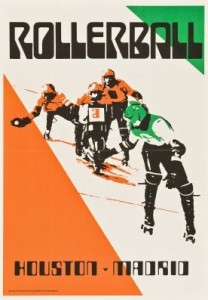 Hey, what the heck is prison doing in your living room?
Hey, what the heck is prison doing in your living room?
Florida Atlantic University recently accepted $5-6 million from the “charitable” arm of GEO Group, a controversial private prison administrator operating in several states. Despite the long-sought windfall, things don’t bode well for FAU: just minutes after news of the deal reached the NY Times, a company spokesperson was caught altering the firm’s Wikipedia entry, attempting to hide the history of human rights abuses that took place in several GEO-run facilities.
Let’s be honest: the buying and selling of naming rights for buildings and sports stadiums has become a ho-hum fact of life. But a university selling those rights to the private prison industry feels like an exasperating defeat. Given the country’s incarceration trends, some of the same young men competing under that banner will likely live under it someday as prison inmates (and cheap labor).
 This is a savvy, if scary, move on the part of GEO Group, the nation’s second largest private prison administrator and a company that cites crime reduction and marijuana decriminalization as threats. Becoming the largest and most profitable firm of its ilk will require deeper and more diversified investment, and what better place to start than by linking your name to a beloved American pastime? The general public may not yet comprehend how much of a prison nation we’ve become, but this sure is a smart, preemptive way to get ‘em comfy with the GEO brand, isn’t it? Welcome to Rollerball.
This is a savvy, if scary, move on the part of GEO Group, the nation’s second largest private prison administrator and a company that cites crime reduction and marijuana decriminalization as threats. Becoming the largest and most profitable firm of its ilk will require deeper and more diversified investment, and what better place to start than by linking your name to a beloved American pastime? The general public may not yet comprehend how much of a prison nation we’ve become, but this sure is a smart, preemptive way to get ‘em comfy with the GEO brand, isn’t it? Welcome to Rollerball.
But let’s dig a little deeper into our benevolent new sports fans. Under GEO Group guard towers, the unhealthy are weeded out (in some cases, through death-by-denial-of-medication), while the rest are divided up into groups based on age, mental acuity, obedience and yes, ethnicity to serve as worker bees. For whom? Why, for companies to whom GEO Group has contracted this labor (for a profit) and for sister firms owned by the same group of investors – who of course are looking, above all, to make a profit.
 This characteristic of the private prison world is already very much a reality in America, though for many it’s a fact that has stayed buried in the social subconscious. Until now, we had yet to see the industry take a step so boldly into our living rooms, our televisions, our sports. Talk about supporting the contention that prison is no longer for “those” (read: other) people! Think about how often, during televised football games, the name of the company that owns the rights to the stadium is mentioned – such positive advertising! Even better, law-abiding, tuition-paying parents, FAU athletes, and students will bear the name of their corporate sponsor with pride, now that it’s been conflated with allegiance to the school itself.
This characteristic of the private prison world is already very much a reality in America, though for many it’s a fact that has stayed buried in the social subconscious. Until now, we had yet to see the industry take a step so boldly into our living rooms, our televisions, our sports. Talk about supporting the contention that prison is no longer for “those” (read: other) people! Think about how often, during televised football games, the name of the company that owns the rights to the stadium is mentioned – such positive advertising! Even better, law-abiding, tuition-paying parents, FAU athletes, and students will bear the name of their corporate sponsor with pride, now that it’s been conflated with allegiance to the school itself.
 Let’s reverse this trend of money first, justice maybe. Send a message to GEO Group that they can’t use schools and athletes to get you more comfortable with the idea of labor camps replacing successful re-entry programs, and tycoons replacing wardens. Sign the petition, keep up with the latest developments, and for God’s sake, stay out of the sort of trouble that might get you locked up – especially in a corporate prison.
Let’s reverse this trend of money first, justice maybe. Send a message to GEO Group that they can’t use schools and athletes to get you more comfortable with the idea of labor camps replacing successful re-entry programs, and tycoons replacing wardens. Sign the petition, keep up with the latest developments, and for God’s sake, stay out of the sort of trouble that might get you locked up – especially in a corporate prison.
Uh, Kids for Cash anyone?




